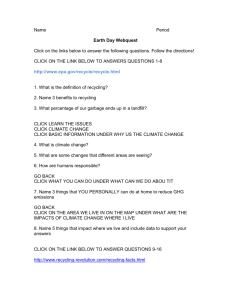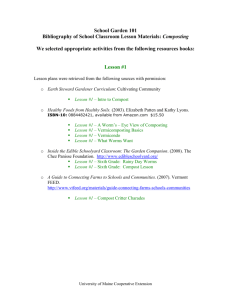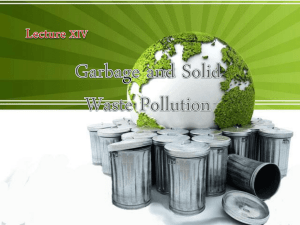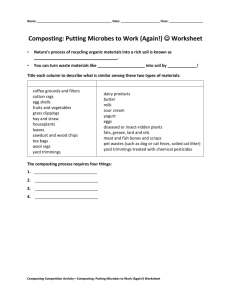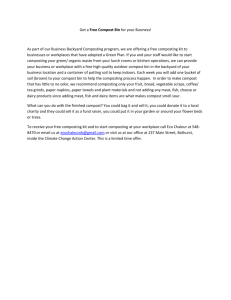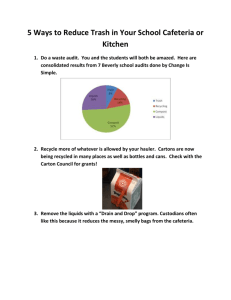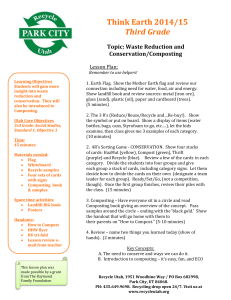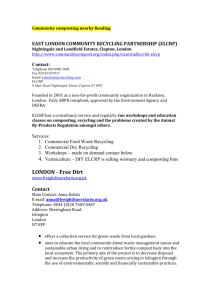Long Beach Township—Blazes a Sustainability Trail: Lifts the lid on
advertisement
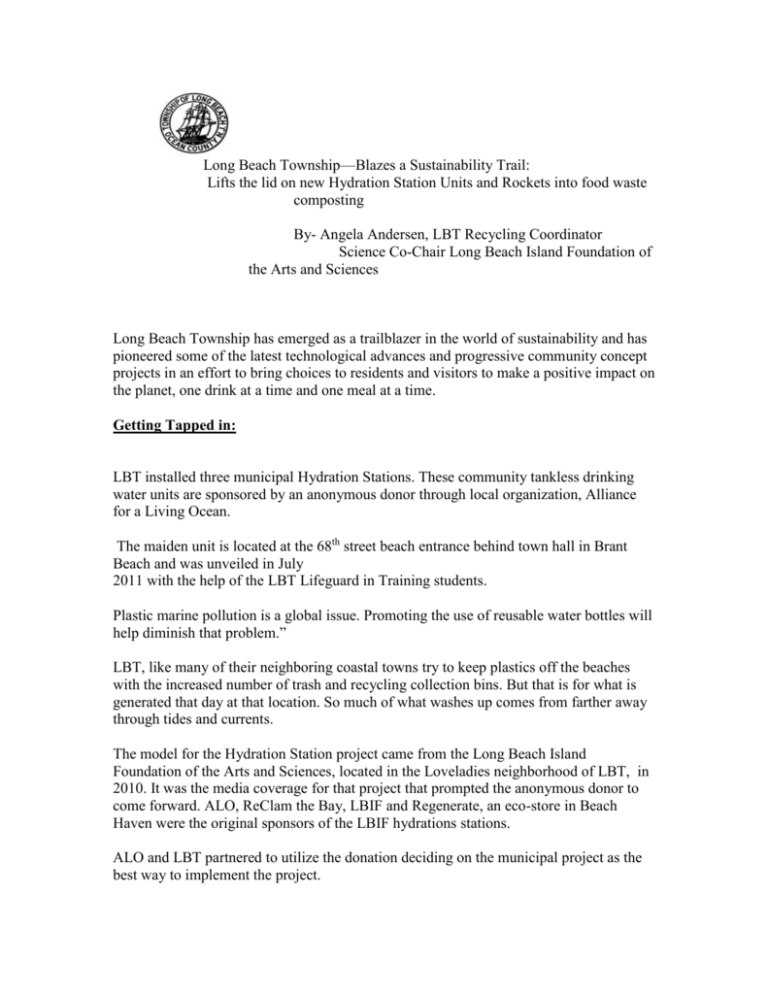
Long Beach Township—Blazes a Sustainability Trail: Lifts the lid on new Hydration Station Units and Rockets into food waste composting By- Angela Andersen, LBT Recycling Coordinator Science Co-Chair Long Beach Island Foundation of the Arts and Sciences Long Beach Township has emerged as a trailblazer in the world of sustainability and has pioneered some of the latest technological advances and progressive community concept projects in an effort to bring choices to residents and visitors to make a positive impact on the planet, one drink at a time and one meal at a time. Getting Tapped in: LBT installed three municipal Hydration Stations. These community tankless drinking water units are sponsored by an anonymous donor through local organization, Alliance for a Living Ocean. The maiden unit is located at the 68th street beach entrance behind town hall in Brant Beach and was unveiled in July 2011 with the help of the LBT Lifeguard in Training students. Plastic marine pollution is a global issue. Promoting the use of reusable water bottles will help diminish that problem.” LBT, like many of their neighboring coastal towns try to keep plastics off the beaches with the increased number of trash and recycling collection bins. But that is for what is generated that day at that location. So much of what washes up comes from farther away through tides and currents. The model for the Hydration Station project came from the Long Beach Island Foundation of the Arts and Sciences, located in the Loveladies neighborhood of LBT, in 2010. It was the media coverage for that project that prompted the anonymous donor to come forward. ALO, ReClam the Bay, LBIF and Regenerate, an eco-store in Beach Haven were the original sponsors of the LBIF hydrations stations. ALO and LBT partnered to utilize the donation deciding on the municipal project as the best way to implement the project. The Township installed the next two locations at Bayview Park in Brant Beach and at the end of Bay Avenue in Holgate in the parking lot of the Edwin B. Forsythe Refuge Park. ALO and LBT are now planning on presenting this environmental solution to build hydration stations to the rest of the municipalities on Long Beach Island. Some local businesses are also expected follow suit. “Put water in your bottle, not your bottle in the water is the mantra the partners in this project have produced,” said Andersen. The hydration stations allow all beachgoers, walkers and bikers of the island to fill their reusable water bottles with cold, filtered, re-mineralized municipal water. The purpose of these stations is to help promote the use of reusable water bottles and reduce the need for plastics. The units are purchased by ALO and provided free of charge to the municipalities. Statistics: filling one reusable bottle keeps 167 single use plastic bottles from entering the environment 270,000 tons of plastic are used to manufacture single use water bottles annuallyPicture your plastic water bottle filled ¼ with oil—that is how much oil is used to create the bottle Buying bottled water costs you more than 1000 x as much as using tap—which we already pay for 8 out of 10 bottles wind up in the land fill or ocean To show commitment to the cause, LBT has installed 7 tankless water coolers in the municipal complex and police station, eliminating the need for water delivery. Rocket into food waste reduction Long Beach Island Consolidated School District RECEIVES BOOST TO AID Coastal Community Composting State Farm® Youth Advisory Board grants $28,500 August 25, 2011 – The State Farm Youth Advisory Board announced in August that the Long Beach Island Consolidated School District was awarded a $28,500 service-learning grant for Coastal Community Composting, an Environmental Responsibility servicelearning project. Long Beach Island Consolidated School District is one of 64 community organizations to receive a youth-led service-learning grant across the United States and Canada. The grant money was used to purchase a Rocket compost unit for the school cafeteria. All K-6 students at the LBICSD will become responsible for collecting and recycling food waste from the school's breakfast and lunch program. Food waste will be composted and returned to the school's vegetable, landscape, and rain gardens to nourish new and existing plantings. Our children will become aware of organic wastes as potential resources, rather than something to be thrown away and forgotten. They will learn through direct experience that they can personally make a difference and have a positive effect on the environment and the community. The grant was jointly written by Technology staff at the school and the Long Beach Township Recycling Coordinator. By addressing the solid waste issue, composting provides a way of instilling in our children a sense of environmental stewardship. Our educational programs already focus on reducing, reusing, and recycling our solid wastes. Composting fits in with this idea but takes it a step beyond. With composting, children can do more than recycling cans, plastic bottles and newspapers, they can see the entire cycle, from their own food scraps to something that is pleasant to handle and good for growing their own vegetables. Additionally, through this project, we have the ability to reach parents and other community members to foster and improve environmental awareness and create a cleaner habitat. At this time there is no food waste collection or composting at the town or county level. It is our hope that our project will translate into a change at those levels, thus changing the climate of waste. Our 'Coastal Community Composting' (CCC) will be enhancing awareness of socioeconomic issues by highlighting the importance of composting, growing produce and volunteer efforts. “We are excited and very thankful for this grant that will enable us to acquire a Rocket Composter though NATH Sustainable Solutions to recycle our food waste. The students in the school district and the community at large will benefit greatly from the purchase.” said Carol Laird, teacher at the Long Beach Island Consolidated School District. The State Farm Youth Advisory Board has granted over $20.7 million in grant money since its inception in 2006, empowering youth to implement service-learning in 331 communities. About the Youth Advisory Board: The State Farm Youth Advisory Board is a diverse group of 30 youth, ages 17-20, who were chosen through a competitive process to lead and oversee this $5 million/year signature service-learning initiative. The Youth Advisory Board identified the issues, issued competitive grants and will now provide technical assistance, communication and oversight to grantees. The Rocket unit is scheduled for launch in the Spring of 2012 Statistics: Recognized as one of the first of its kind in the nation, LBICSD follows the lead of other sustainable communities in New Jersey. The Chatham Township Food Waste Composting Program has been operational since 2011 and acts as a mentor for the LBI project. The recipe which LBI is modeling from Chatham is set apart from other composting programs because of its three key ingredients: 1. Incorporating composting concepts into curriculum 2. Reducing school waste reduction 3. Integrating the food waste composting efforts of the residents, community organizations and providing the community with compost Tidy Planet's Rocket® Composter. What is Composting? Composting is nature's way of recycling! It is a process of recycling decomposed organic materials into a rich soil known as compost. Anything that was once living will decompose. Basically, backyard composting is an acceleration of the same process nature uses. If you have a balance of fallen leaves or straw (we call “browns”) and kitchen food scraps and grass clippings (we call “greens”), then you have all you need to make compost. Finished compost looks like soil–dark brown, crumbly and smells like a forest floor. Statistics: Compost in the earth holds moisture Composting reduces carbon footprint: e.g., less garbage, so less to landfills = less methane emissions from landfills (also, eventually, fewer garbage trucks / pick up = less CO2 emitted, less pollution) Composting reduced expenses: e.g., less garbage = reduced garbage fees (cost of solid waste removal in Ocean County 71.21 per ton for household waste) -Can earn municipalities “Action Points” under the “Sustainable Jersey Program” (www.sustainablejersey.org), which Long Beach Township is a registered community.

